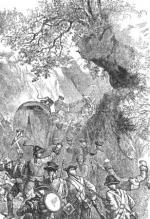![header=[Marker Text] body=[General Braddock's army ascended the ridge east of this point and advanced toward Gist's Plantation. Col. Dunbar's detachment, following with the heavy baggage, made its last camp here. Later, as Braddock's defeated army streamed back, Dunbar destroyed his supplies and withdrew.
] sign](http://explorepahistory.com/kora/files/1/10/1-A-6D-139-ExplorePAHistory-a0a3d6-a_450.gif)
Mouse over for marker text
Name:
Braddock Road (Dunbar's Camp)
Region:
Laurel Highlands/Southern Alleghenies
County:
Fayette
Marker Location:
SR 2021 ca. 3 miles North of US 40 at Jumonville
Dedication Date:
June 17, 1952
Behind the Marker
Colonel Thomas Dunbar commanded the 48th Regiment, one of the two Irish regiments that accompanied Braddock to America. When Braddock decided to split his army en route to Fort Duquesne, he left Dunbar in charge of the slower-moving support column. It was to Dunbar's Camp that the remnants of Braddock's flying column retreated after the debacle at  Braddock's Crossing.
Braddock's Crossing.
Upon inheriting command after Braddock's death, Dunbar decided against launching a counterattack against Fort Duquesne, even though he still commanded a formidable and well-supplied army. Instead, he continued the retreat to Fort Cumberland, which he reached on July 22. Two weeks later, he decided to march his troops to Philadelphia, where he surprised the city's residents by requesting winter quarters. Ultimately, he took the army north to Albany, where it encamped for the rest of the year.
Braddock's battle on the Monongahela had been a disaster, but Dunbar's abandonment of the campaign poured salt on the wound. It exposed the frontiers of Pennsylvania, Maryland, and Virginia to French-sponsored Indian attacks and piled further humiliation on the British cause. Referring to the horrific casualties the British had sustained against a nearly invisible foe, Horace Walpole called Braddock's Defeat "the longest battle that ever was fought with nobody." One of its many repercussions was the formative experience in frontier warfare it gave to several figures who would later play important roles in the Revolutionary Era: George Washington, Thomas Gage, Horatio Gates, and Daniel Boone.
Braddock's Defeat "the longest battle that ever was fought with nobody." One of its many repercussions was the formative experience in frontier warfare it gave to several figures who would later play important roles in the Revolutionary Era: George Washington, Thomas Gage, Horatio Gates, and Daniel Boone.
Upon inheriting command after Braddock's death, Dunbar decided against launching a counterattack against Fort Duquesne, even though he still commanded a formidable and well-supplied army. Instead, he continued the retreat to Fort Cumberland, which he reached on July 22. Two weeks later, he decided to march his troops to Philadelphia, where he surprised the city's residents by requesting winter quarters. Ultimately, he took the army north to Albany, where it encamped for the rest of the year.
Braddock's battle on the Monongahela had been a disaster, but Dunbar's abandonment of the campaign poured salt on the wound. It exposed the frontiers of Pennsylvania, Maryland, and Virginia to French-sponsored Indian attacks and piled further humiliation on the British cause. Referring to the horrific casualties the British had sustained against a nearly invisible foe, Horace Walpole called





